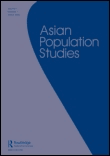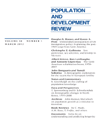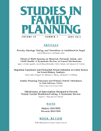
Asian Population Studies
metrics 2024
Unveiling Insights into Demographic Trends
Introduction
Asian Population Studies is a distinguished journal published by Routledge Journals, Taylor & Francis Ltd, delivering comprehensive insights into the vibrant field of demography. Since its inception in 2006, this peer-reviewed journal has consistently provided a platform for high-quality research that enhances our understanding of population dynamics in Asia. With an impressive category ranking of Q2 in Demography for 2023, and holding a notable position as 35th out of 139 within the Scopus ranking, it is recognized for its significant contributions to the field, appealing to researchers, scholars, and professionals alike. The journal covers a diverse range of topics, including population growth, migration patterns, and socio-economic factors influencing demographic changes across Asian countries. Although it does not offer open access, Asian Population Studies remains a vital resource for those seeking to explore demographic trends and their implications for policy and practice in one of the most populous regions of the world. With a commitment to academic excellence, it continues to serve as an essential tool for anyone engaged in demographic research and study.
Metrics 2024
 0.56
0.56 1.50
1.50 2.30
2.30 28
28Metrics History
Rank 2024
Scopus
IF (Web Of Science)
JCI (Web Of Science)
Quartile History
Similar Journals

European Journal of Population-Revue Europeenne de Demographie
Connecting Scholars to the Heart of DemographyWelcome to the European Journal of Population-Revue Europeenne de Demographie, a premier scholarly publication dedicated to advancing the field of demography. Published by Springer since 1985, this journal has established itself as a vital resource for researchers, professionals, and students interested in population studies, evidenced by its Q1 ranking in Demography for 2023 and a notable Scopus ranking within the top 20% of its category. With an ISSN of 0168-6577 and an E-ISSN of 1572-9885, the journal provides a platform for high-quality, peer-reviewed research, contributing to the understanding of population dynamics and demographic trends across Europe and beyond. Although currently not open access, the journal ensures broad mobility of knowledge through diverse access options, aspiring to bridge theoretical insights and practical applications crucial for policy-making and societal engagement. Join us in exploring the intricate tapestry of demographic data as we examine pressing issues such as migration, fertility, mortality, and population aging in an ever-evolving global context.

Ager-Revista de Estudios sobre Despoblacion y Desarrollo Rural
Advancing Knowledge in Population and PlaceAger-Revista de Estudios sobre Despoblacion y Desarrollo Rural, published by PRENSAS UNIV ZARAGOZA, is a distinguished academic journal focused on the critical fields of demography, rural development, and geography. With an ISSN of 1578-7168 and E-ISSN of 2340-4655, this journal serves as a vital resource for researchers, professionals, and students dedicated to understanding the dynamics of population decline and sustainable development in rural areas. The journal has gained recognition for its quality, evidenced by its placement in the Q3 category across multiple domains in the 2023 rankings, including Demography, Development, and Geography, Planning and Development. Additionally, it holds impressive Scopus ranks, notably at 48th percentile in Demography and 78th percentile in Anthropology. With contributions from eminent scholars and practitioners, Ager not only disseminates high-quality research but also nurtures discourse on policy implications and innovative solutions for rural challenges. The journal is open access, fostering broad accessibility and encouraging scholarly dialogue in the critical study of population and rural development. Whether you are a seasoned researcher or an emerging scholar in the field, Ager provides a platform for impactful insights and collaboration in tackling pressing rural socio-economic issues.

Revista Latinoamericana de Poblacion
Empowering Scholars to Understand Population ChangesRevista Latinoamericana de Poblacion is a distinguished open-access journal dedicated to the field of population studies, published by the Asociación Latinoamericana de Población. Since its inception in 2007, the journal has aimed to foster scholarly dialogue and disseminate critical research on demographic dynamics across Latin America. With an emphasis on diverse methodologies and interdisciplinary approaches, the journal serves as a platform for researchers, professionals, and students to engage with pressing issues such as migration, fertility, aging, and socio-economic factors influencing population trends. As an invaluable resource for the academic community, this journal not only promotes accessibility to vital research through its open-access model but also plays a crucial role in enhancing the understanding of demographic changes and their implications in the region. By focusing on the unique context of Latin America, Revista Latinoamericana de Poblacion facilitates a deeper insight into population phenomena that resonate globally.

Canadian Studies in Population
Exploring Canada's Demographic LandscapeCanadian Studies in Population, published by Springer, is a prestigious journal dedicated to advancing the field of demography and the history of population studies within Canada and beyond. With an ISSN of 0380-1489 and an E-ISSN of 1927-629X, this journal has proudly contributed to scholarly discourse since its inception in 1975, and continues to make significant impacts through its rigorous research articles and comprehensive reviews. Recognized for its high academic standards, it boasts a Q2 ranking in Demography and a Q1 ranking in History in 2023, reflecting the journal's critical role in shaping contemporary understanding of demographic trends and historical population developments. With a Scopus rank of #51/139 in Demography and #83/1760 in History, it appeals to a diverse audience including researchers, professionals, and students eager to explore population dynamics, historical context, and societal implications of demographic shifts. While the journal maintains traditional subscription access options, its rigorous peer-reviewed content ensures that it remains a cornerstone for scholars seeking credible and influential insights in their respective fields.

JOURNAL OF POPULATION ECONOMICS
Pioneering Research at the Intersection of Demography and EconomicsThe JOURNAL OF POPULATION ECONOMICS, published by SPRINGER, stands as a leading peer-reviewed journal in the fields of demography and economics. Established in 1988, this esteemed journal offers a platform for high-quality research that probes the intricate relationships between population dynamics and economic phenomena. With its impressive Q1 quartile ranking in both Demography and Economics and Econometrics for 2023, the journal is recognized as a vital resource for scholars and practitioners alike, reflecting its rigorous standards and impact in the academic community. Its Scopus rankings position it within the top tiers of social sciences, making it an essential read for those engaged in demographic and economic research. Although the journal does not currently adopt an open access model, its esteemed reputation and continuous publication until 2024 ensure relevant and up-to-date findings contribute meaningfully to scholarly discourse. At its core, the JOURNAL OF POPULATION ECONOMICS aims to bridge theoretical insights and empirical findings, fostering an understanding of how population changes influence economic outcomes and vice versa.

Journal of Demographic Economics
Connecting Dots Between Demography, Economics, and GeographyThe Journal of Demographic Economics, published by Cambridge University Press, stands as a leading interdisciplinary platform dedicated to the exploration and advancement of research in the intertwined fields of demography, economics, and geography. With an impact factor that reflects its esteemed position—ranking in the Q1 quartile for Demography (2023)—the journal fosters scholarly dialogue through high-quality articles that elucidate the complex interactions between population dynamics and economic trends. Operating under an open access model, the journal ensures that its findings are widely accessible, promoting inclusivity and engagement among researchers, professionals, and students alike. The Journal of Demographic Economics endeavors to bridge gaps in knowledge by publishing innovative and rigorous studies, thereby contributing significantly to both theoretical frameworks and practical applications across various domains. Drawing submissions from a global audience, this journal not only enhances the understanding of demographic transitions but also informs policy decisions and socioeconomic development strategies, making it an essential resource for those invested in demographic and economic research.

POPULATION AND DEVELOPMENT REVIEW
Bridging Research and Policy in Population Studies.Population and Development Review is a prestigious academic journal published by Wiley, recognized for its comprehensive exploration of the intersections between population dynamics and development processes. Since its inception in 1976, the journal has contributed significantly to the field, featuring rigorous peer-reviewed articles that address pressing issues in demography, development, and sociology, maintaining a commendable reputation with a Q1 ranking across multiple categories as of 2023. With an impact factor that reflects its influence—ranking in the 90th percentile in Sociology and Political Science, and 85th percentile in Development—this journal serves as a vital resource for researchers, policy-makers, and students alike. It is instrumental in fostering dialogue and disseminating knowledge that shapes and informs public policy and academic inquiry. Although not an open-access publication, it remains accessible through various academic institutions, ensuring that its valuable insights are available to a broad audience eager to engage with the complexities of population and development.

STUDIES IN FAMILY PLANNING
Transforming understanding of reproductive health dynamics.STUDIES IN FAMILY PLANNING, published by WILEY, is a renowned journal that serves as a critical resource in the fields of Demography and Social Sciences. With an impressive Q1 ranking in both categories, it is recognized for its high impact and influential contributions to the understanding of family planning dynamics, reproductive health, and population studies. The journal has published scholarly articles since 1970, reflecting its long-standing commitment to advancing knowledge and research in these important areas. Currently holding a rank of #27 out of 139 in Demography on Scopus, the journal's 2023 impact factor underscores its influential role in shaping policy and practice worldwide. Though it operates under a subscription model, it is readily accessible to members of the academic community, including researchers, professionals, and students dedicated to improving family planning systems and socio-demographic studies.

Population Review
Exploring the Dynamics of Population ChangePopulation Review, published by Sociological Demography Press, is a vital resource in the field of demography, contributing to the understanding of population dynamics and trends since its inception in 1988. With an ISSN of 1549-0955 and an E-ISSN of the same number, the journal has played a significant role in disseminating scholarly research and analysis relevant to demographic changes and their implications. Although currently categorized in the Q4 quartile, it ranks 78th out of 139 in the Scopus Social Sciences: Demography category, placing it within the 44th percentile among its peers. This journal serves as a platform for researchers, professionals, and students to engage with contemporary population issues, encouraging the exploration of new theories and methodologies. While not available as open access, its robust editorial standards and commitment to rigorous research make it an invaluable addition to the libraries of demographers and social scientists alike.

GENUS
Empowering Research for a Sustainable Future in DemographyGENUS is a prestigious open-access journal published by SpringerNature, dedicated to advancing research in the field of demography. With an E-ISSN of 2035-5556, it has been operating as an open-access platform since 2016, ensuring that valuable demographic knowledge is accessible to a global audience. Located in Switzerland, this journal contributes significantly to the scholarly community, achieving a remarkable Q1 ranking in the 2023 Scopus category for Social Sciences focusing on Demography, where it stands at an impressive Rank #12 out of 139, placing it in the 91st percentile. With a history that spans several decades, starting from 1970 and including comprehensive coverage from 2007 to 2024, GENUS provides a vital forum for researchers, professionals, and students seeking to engage deeply with current demographic studies. This journal not only publishes cutting-edge research but also facilitates fruitful discussions on key demographic trends and policies, making it an essential resource for anyone interested in the social sciences.